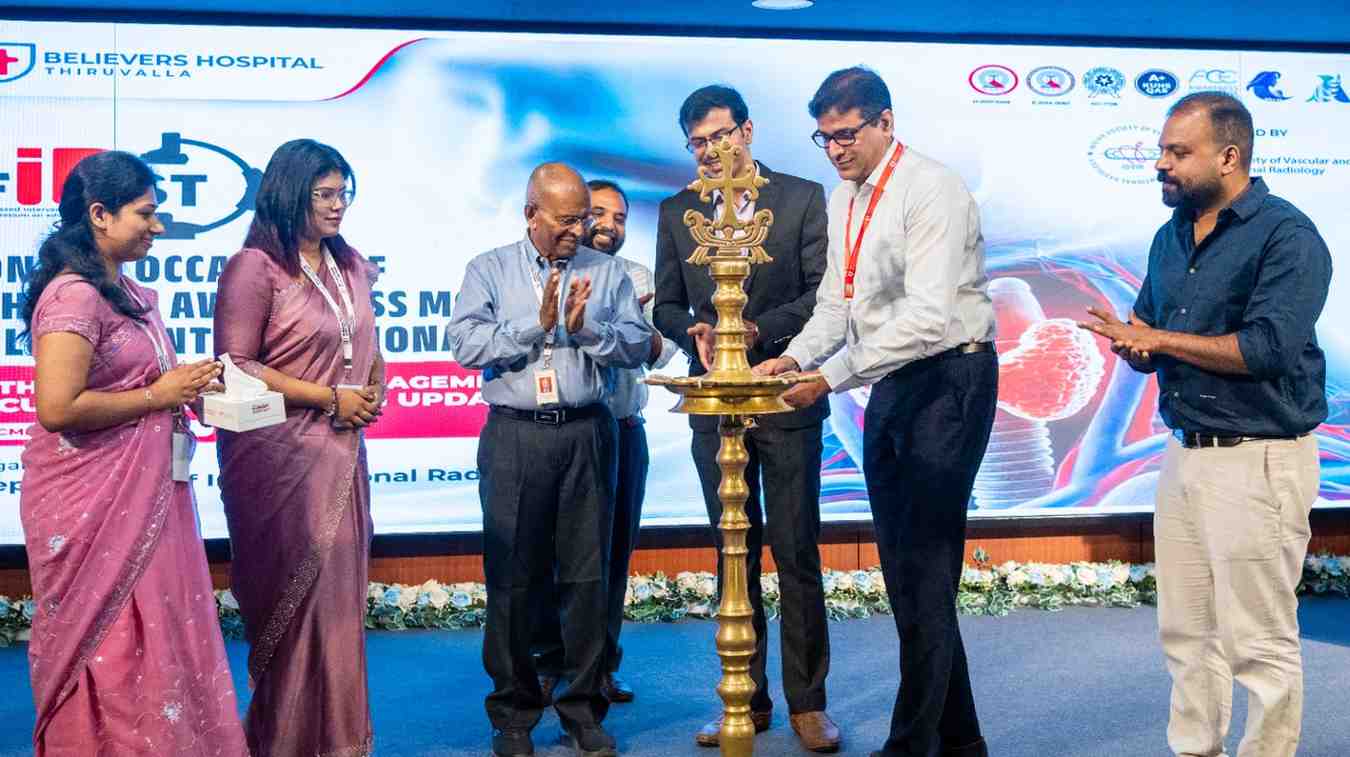Overview
Interventional Radiology (IR) is a modern medical specialty that uses minimally invasive techniques to diagnose and treat a wide range of conditions. Using small, pinhole-sized incisions and advanced imaging guidance (such as X-ray, ultrasound, and CT scans), interventional radiologists can access organs and blood vessels with extreme precision—without the need for traditional open surgery.
These procedures are performed by highly trained interventional radiologists, who are experts in image-guided, endovascular techniques.
Why Choose Interventional Radiology?
-
Minimal or no visible scars
-
Reduced risk of complications
-
Less pain and faster recovery
-
Shorter hospital stays
-
Quick return to daily activities
At Believers Church Medical College Hospital in Thiruvalla, our Interventional Radiology unit is equipped with the latest technology and led by a team of expert specialists. We work closely with other departments to provide personalized, comprehensive treatment plans that enhance outcomes and quality of life.
Choose us for advanced interventional radiology in Pathanamthitta—where innovation meets compassionate care.
Services
Gastroenterology & Hepatobiliary Interventional Procedures
-
Angioembolization and coiling in gastrointestinal emergency bleeding: This procedure helps control severe bleeding in the gastrointestinal tract by blocking the affected blood vessels.
-
Percutaneous transhepatic biliary drainage (PTBD) and stenting: Used to relieve obstructions in the bile ducts, often caused by tumors or stones.
-
Percutaneous cholecystostomy/Pancreatic collection drainages: Minimally invasive methods to drain infected or fluid-filled areas in the gallbladder or pancreas.
-
CT/Ultrasound guided percutaneous catheter drainage (PCD) for intra-abdominal collections: Used to remove abscesses or infected fluids from the abdomen.
-
Shunt occlusion procedures (PARTO, BRTO, CARTO) in gastric variceal related bleeding or refractory hepatic encephalopathy: These procedures help manage complications of liver disease by redirecting blood flow.
-
TIPS in variceal bleed or recurrent ascites: Transjugular Intrahepatic Portosystemic Shunt (TIPS) creates new connections between blood vessels in the liver to treat portal hypertension.
-
Portal vein embolization for hepatic resection: This procedure prepares the liver for surgery by blocking blood flow to certain areas, encouraging growth in others.
-
Pre-operative embolization of hypervascular tumors: Reduces blood supply to tumors before surgery.
-
Partial splenic artery embolization/embolization in ruptured liver tumors: Manages bleeding from the spleen or liver tumors.
-
Hepatic Venous Pressure Gradient (HVPG) for cirrhotic patients: Measures pressure in the liver veins to assess the severity of cirrhosis.
-
Trans Jugular Liver Biopsy (TJLB): A method to obtain liver tissue samples for diagnosis through the veins.
Interventional Oncology Procedures
-
Liver cancer treatment – Radiofrequency/Microwave ablation, TACE, PEI: Minimally invasive treatments that destroy cancer cells using heat, chemicals, or particles.
-
Ablation of other tumors: Uses heat or chemicals to destroy tumors in various organs.
-
Palliative interventions – biliary stenting in advanced malignant obstructive jaundice, nerve blocks, ablation of metastases: Procedures to relieve symptoms and improve quality of life in advanced cancer cases.
-
CT/Ultrasound guided FNAC and Biopsy: Needle procedures to obtain tissue samples for diagnosis.
Nephrological - Urological Interventional Procedures
-
Percutaneous nephrostomy/antegrade ureteric stenting: Procedures to relieve urinary obstructions by placing tubes or stents.
-
Embolization of post-PCNL/post-renal biopsy hematuria: Stops bleeding in the kidneys after certain procedures.
-
Embolization of bleeding renal tumors like angiomyolipoma: Controls bleeding from kidney tumors.
-
Pre-operative embolization of renal cell carcinoma: Reduces blood flow to kidney tumors before surgery.
-
Embolization of varicocele causing infertility: Treats enlarged veins in the scrotum that can cause infertility.
-
AV fistuloplasty/thrombolysis: Treats blood clots and other issues in dialysis access points.
-
Renal biopsy – percutaneous/transjugular: Obtains kidney tissue samples for diagnosis.
Gynecological Interventional Procedures
-
Uterine fibroid embolization: Shrinks fibroids by cutting off their blood supply.
-
Embolization in cases of postpartum hemorrhage: Controls severe bleeding after childbirth.
-
Fallopian tube recanalization in tubal blocks causing infertility: Opens blocked fallopian tubes.
-
Embolization in cases of pelvic congestion syndrome: Treats chronic pelvic pain caused by varicose veins in the pelvis.
Specialists
FAQ
Surgery works best for solid tumors that are contained in one area. It is a local treatment, meaning that it treats only the part of your body with the cancer. It is not used for leukemia (a type of blood cancer) or for cancers that have spread.
A course of chemotherapy usually lasts between 3 to 6 months, although it can be more or less than that. How often you have each cycle, and how long your treatment course lasts, depends on many factors. These include:
-
Type of cancer
-
Stage of the cancer
-
Types of drugs that you’re having
-
Side effects the drugs might cause
-
Time you’ll need to recover from side effects
News & Events

Thyroid Nodule Management : Current Concepts & Updates One-Day CME & Workshop
A one-day CME…
View this Post



Thyroid Nodule Management : Current Concepts & Updates One-Day CME & Workshop
A one-day CME…
View this Post

In a collaborative effort to combat cancer, "Kerala Can," a flagship initiative jointly organized by…
View this Post






